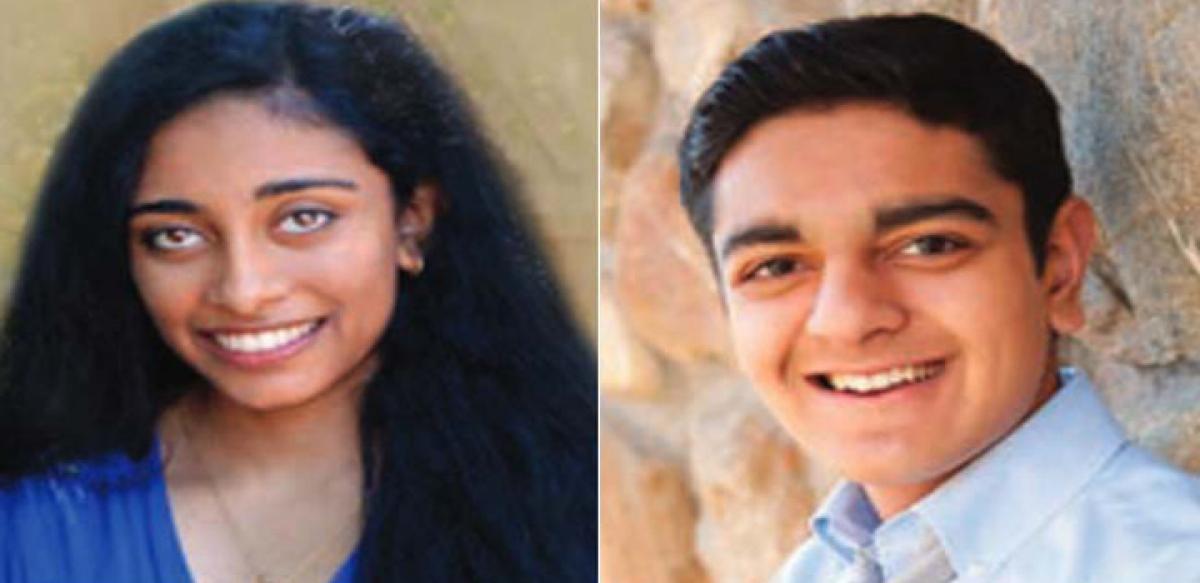Live
- Manchu Vishnu Warns Media Over Family Controversy, Mohan Babu Incident
- Atul Subhash’s Suicide Sparks Outrage; Estranged Wife, Judge Accused of Harassment
- Malaria cases, deaths in India decline by 69pc between 2017-2023: WHO
- ED raids three places in Bengal in online forgery scam case
- Manchu Manoj Questioned by Police Amid Family Dispute
- Bengaluru: IMD Issues Yellow Alert Amid Upcoming Rainfall
- Manchu Vishnu Addresses Media, Clarifies Incident Involving Mohan Babu
- HPCL inks pact with Sea6 Energy to convert seaweed biomass into fuels
- Numaish 2025: Hyderabad’s Grand Exhibition Kicks Off in January – All You Need to Know
- There will be opportunities from every crisis, says CM Chandrababu at collectors' conference
Just In

Six Indian-American students have grabbed top positions, including two winning spots in two separate categories, in a USD 1 million Intel Talent Search contest, a prestigious US competition for young innovators. Of the first three-place awards, Indian-American students won two of them- Amol Punjabi won the First Place Medal of Distinction for Basic Research, while Maya Varma won the First Place Me
Washington: Six Indian-American students have grabbed top positions, including two winning spots in two separate categories, in a USD 1 million Intel Talent Search contest, a prestigious US competition for young innovators. Of the first three-place awards, Indian-American students won two of them- Amol Punjabi won the First Place Medal of Distinction for Basic Research, while Maya Varma won the First Place Medal of Distinction for Innovation.
- Amol Punjabi and Maya Varma, shared first medal for developing a software and a smart phone-based health app respectively
- Meena Jagadish and Milind Jagota sharedsecond medal for research on algebric combinatorics and random nanowire networks respectively
- Kunal Shroff and Kavya Ravichandran sharedthird medal for research in Huntington’s symptoms and developing nanomedicine to destroy fatal blood clots respectively
Same was the case with the second and third spots in all the three categories, as per the list of winners released by Intel Science last night. Paige Brown from Maine won the First Place Medal of Distinction for Global Good. "They and the rest of the top winners of Intel STS 2016 are using science and technology to help address the problems they see in the world and will be at the forefront of creating the solutions we need for the future,"
said Maya Ajmera, president and CEO of Society for Science & the Public and alumna of the Science Talent Search. Punjabi, 17, from Massachusetts, developed software that could help drug makers develop new therapies for cancer and heart disease. He is the lead author of a paper on nanoparticles published in ACS Nano and co-author of a paper on a related topic in Nanoscale.
Varma, 17, from California, used USD 35 worth of hobbyist electronics and free computer-aided design tools to create a low-cost, smartphone-based lung function analyser that diagnoses lung disease as accurately as expensive devices currently used in medical laboratories.
Meena Jagadeesan, 17, from Illinois, won the Second Place Medal of Distinction for Basic Research. Milind Jagota, 18, from Pennsylvania, won the Second Place Medal of Distinction for Innovation. Kunal Shroff, 17, from Virginia, won the Third Place Medal of Distinction for Basic Research. Kavya Ravichandran, 17, from Ohio, won the Third Place Medal of Distinction for Innovation. Building on the top award prizes of USD 150,000, three second-place winners received awards of USD 75,000, and three third-place winners received awards of USD 35,000.
Jagadeesan won the Second Place Medal of Distinction for Basic Research for investigating an object in algebraic combinatorics to show a novel relationship between classes of graphs. Jagota won the Second Place Medal of Distinction for Innovation for researching the performance of random nanowire networks as a less costly alternative to the transparent conductors now used in touchscreen devices.
Shroff was awarded the Third Place Medal of Distinction for Basic Research for finding relationship between the key proteins associated with Huntington's disease and the biological processes of cellular death that cause Huntington's symptoms. Ravichandran won the Third Place Medal of Distinction for Innovation for using nanomedicine to destroy potentially fatal blood clots that can cause heart attacks and strokes.

© 2024 Hyderabad Media House Limited/The Hans India. All rights reserved. Powered by hocalwire.com







